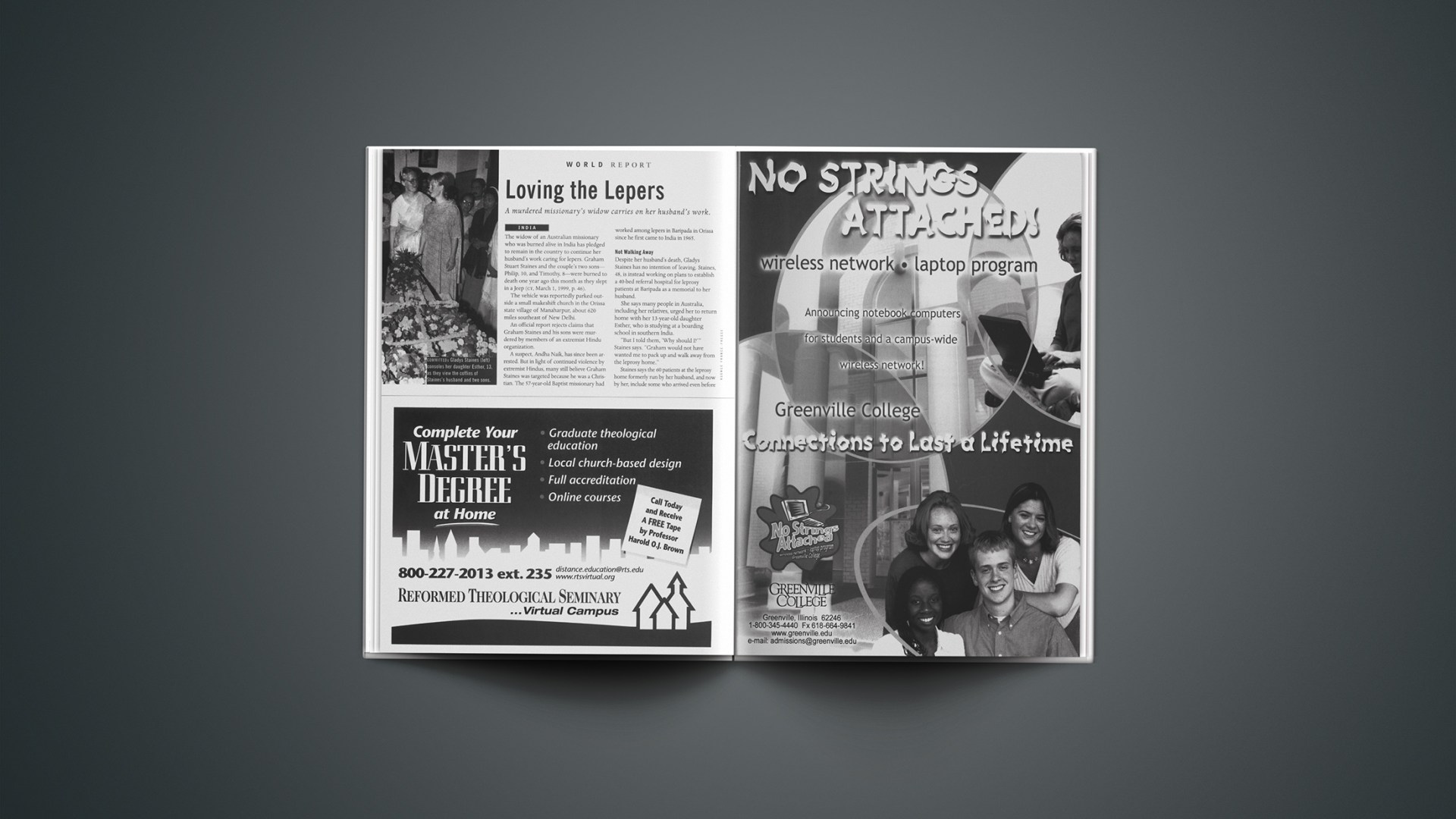The widow of an Australian missionary who was burned alive in India has pledged to remain in the country to continue her husband's work caring for lepers. Graham Stuart Staines and the couple's two sons—Philip, 10, and Timothy, 8—were burned to death one year ago this month as they slept in a Jeep (CT, March 1, 1999, p. 46).
The vehicle was reportedly parked outside a small make shift church in the Orissa state village of Manaharpur, about 620 miles southeast of New Delhi.
An official report rejects claims that Graham Staines and his sons were murdered by members of an extremist Hindu organization.
A suspect, Andha Naik, has since been arrested. But in light of continued violence by extremist Hindus, many still believe Graham Staines was targeted because he was a Christian. The 57-year-old Baptist missionary had worked among lepers in Baripada in Orissa since he first came to India in 1965.
Not Walking Away
Despite her husband's death, Gladys Staines has no intention of leaving. Staines, 48, is in stead working on plans to establish a 40-bed referral hospital for leprosy patients at Baripada as a memorial to her husband.
She says many people in Australia, including her relatives, urged her to return home with her 13-year-old daughter Esther, who is studying at a boarding school in southern India.
"But I told them, 'Why should I?'" Staines says. "Graham would not have wanted me to pack up and walk away from the leprosy home."
Staines says the 60 patients at the leprosy home formerly run by her husband, and now by her, include some who arrived even before her husband came to the center 34 years ago. Esta blished in 1897, the leprosy home in Baripada had been managed by the Evangelical Missionary Society, to which Graham Staines belonged. "I cannot just leave those people who love and trust us," Gladys Staines says.
Apologies Accepted
Staines insists the murder of her husband and sons has not changed her impression of India. "I have high regard for the people of India and their tolerance," Staines says, adding that the outpouring of public sympathy after the murders was "amazing." She received thousands of letters from abroad and from Indians from all walks of life—most of them Hindus—apologizing for what had happened. One man who recognized Staines at a Calcutta airport approached her, saying, "Madam, we are ashamed. This has nothing to do with Hindu ism."
Staines describes the killings as a well-planned act by radical groups, but she is quick to add that Christians are not the only ones being targeted. In Bihar state in eastern India, she points out, clashes between upper-caste and lower-caste Hindus often lead to bloodshed.
Describing her prompt forgiveness of the killers as a "spontaneous act," Staines says "it took away the bitterness" that otherwise would have remained in her heart. She has not received any threats since the incident.
But Christians—who make up about 2.5 percent of India's nearly 1 billion population—and other religious minorities remain targets of Hindu fundamentalists over "forced conversions." A Catholic priest was killed in September. Pope John Paul II, on a visit to India in November, encouraged increased evangelism and positioned the right to change religions as a human rights issue. The pontiff's visit sparked protests and threats of in creased violence toward Christians (CT, December 6, 1999, p. 31).
New Home
Staines first came to India in 1981 when a training organization sent her from Brisbane, Australia, to Orissa. She met Graham Staines at the leprosy center and they were married two years later. Over the years, Orissa has become home. "I am comfortable with the people, customs, and their language," says Staines, who wears saris, the traditional dress of Indian women.
"The people of Baripada have accepted us among them as part of the community. Most of our friends are Hindus. I speak Santhali [a local language] and feel I am more an Indian than an Australian," she says, adding that she is considering applying for Indian citizenship.
But her immediate task is to fulfill her husband's dream of building a leprosy hospital in Baripada. Though the incidence of leprosy has begun to decline in Orissa, those with deformities still need reconstructive surgery. No such facility is available in the region. "So their stigma remains though they are fully cured," Staines says.
Some Hindu extremists have alleged that missionaries are converting India's "gullible poor" under the guise of social service. "If you look at the history of India, the Christian presence remains more or less static," Staines says. "If we were converting the people we were serving, it could not be so."
The Christian commitment to social service, she says, is "rooted in Christ's message of love."
Copyright © 2000 Christianity Today. Click for reprint information.










